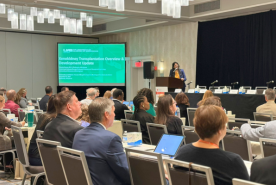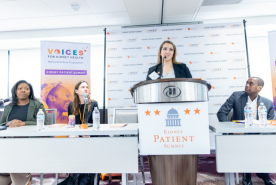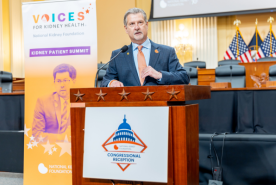May 07, 2020
By Kevin Longino, National Kidney Foundation CEO and kidney transplant patient
COVID-19 hits people differently and is especially hard on kidney patients. It is a dangerous illness that is putting patients’ lives at grave risk. The virus certainly hasn’t hit pause, but neither has kidney disease and nor have we.
At the state level
As states continue to reopen, NKF’s local offices throughout the country quickly got to work hosting briefings for state legislators to ensure they fully understand the impact of COVID-19 on kidney patients. The briefings, led by local NKF medical leadership, cover what lawmakers and communities can do to help protect kidney patients during the pandemic, offers our assistance in helping kidney patients find the resources they need, and also set the stage for some of our other legislative priorities, like living donor protection laws.
NKF hasn’t hit pause on advocating for living donors and we continue to work with states to change laws to remove barriers to living donation. This week, NKF volunteers testified before the Missouri state legislature in support of a bill that would prevent discrimination against living donors seeking life, disability or long-term care insurance. We’re also working to ensure passage of HB46 in Kentucky, a bill that would grant paid leave to state employees who need time-off to recover from organ donation surgery. Thanks to NKF’s state advocacy efforts, 41 of the 50 states have laws on the books that offer some form of protection or relief to living donors. Removing barriers for donors is critical to increasing organ donation, which has been declining during COVID-19.
At the federal level
During a hearing this week, Congresswoman Jaime Herrera Beutler (R-WA) – a leading kidney champion in Congress – highlighted how COVID-19 is affecting all kidney patients, even those who don’t get infected. View her poignant comments.
What comes next?
Our patients are worried, and so are we. Keeping people without underlying conditions safe is hard enough during a pandemic, keeping people with serious, chronic conditions safe when states are reopening is quite another. NKF has developed new resources for patients to answer patient questions covering everything from going out to eat, traveling and wearing a face mask to continuing with transplant and elective surgeries.
You can help us elevate the need to ensure kidney patients are protected at the state and national level by signing the petition NKF initiated last week. We’re advocating that life-critical “elective” surgeries (such as vascular access procedures) be given priority, patients be allowed to receive 90-day supplies of immunosuppressive drugs covered by Medicare Part B, testing for COVID-19 be increased and prioritized for kidney patients, patients with kidney failure retain their access to non-emergency medical transportation, and that living and deceased donor organ transplants be prioritized given the steep declines we’re seeing.
Telehealth gets a boost
Last month, NKF joined with several other stakeholders to advise the U.S. Department of Health and Human Services (HHS) on ways to address kidney patients’ needs during the COVID-19 Public Health Epidemic. Among other recommendations, NKF supported a proposal to improve Medicare coverage for telehealth visits without videos. This week, the Centers for Medicare and Medicaid Services (CMS) announced that doctors will now get paid the same whether the consultations are audio-visual or audio-only. This will help improve access for patients who have limited access to internet technologies, don’t have smart phones, or for older patients who just prefer to use a regular phone.
The new normal
NKF is hosting a Facebook Live and Webinar: The New Normal: What kidney patients need to know as the country begins to reopen on Thursday, May 7th at 2:30PM ET/11:30AM PT. NKF’s Chief Medical Officer, Dr. Joseph Vassalotti and NKF’s President, Dr. Holly Kramer, will talk about precautions and considerations for kidney patients, transplant recipients, and caregivers before they return to work and other regular daily activities. Topics will cover questions like if kidney patients still need to quarantine themselves after the country reopens, when to restart regular lab visits, and what’s top of mind to most people, how quickly patients will be able to interact with their families again.
Final thoughts
As we continue to hear about national chains and local shops filing for bankruptcy, unemployment rising and more dismal financial news, it can be tempting to just disregard the social distancing, handwashing and face masks in an attempt to get things back to normal. My concern is that if we reopen too soon, before states are really prepared to test all dialysis patients, transplant patients and their care teams, and trace and control this virus, it will only create more cases of coronavirus for high risk kidney patients, loss of life and higher costs to taxpayers. And that, to me, is not the definition of normal.
As always, please continue to check our COVID-19 resource page where we post all the latest information on issues facing our community. If you have questions or need support, please contact our toll free patient information help line by calling (855) NKF-CARES, (1-855-653-2273) or by email nkfcares@kidney.org. And join our free online discussion forums.
Be well and stay safe.

















